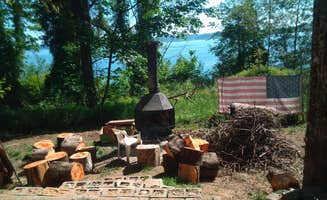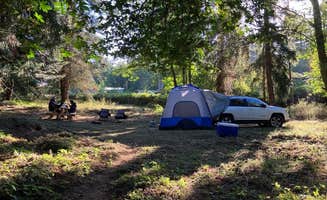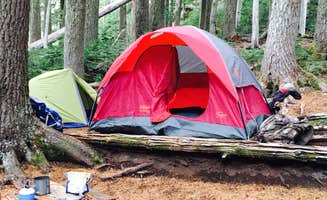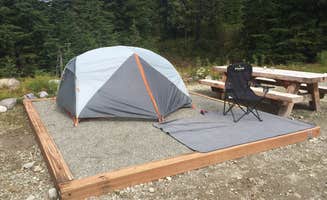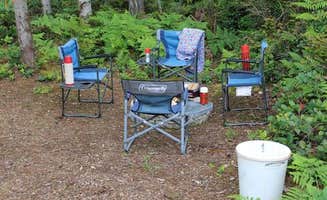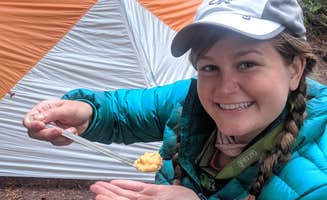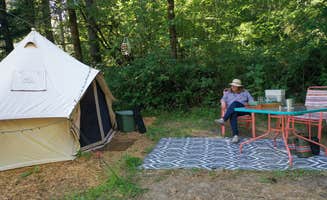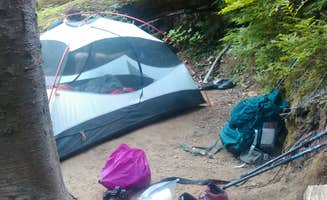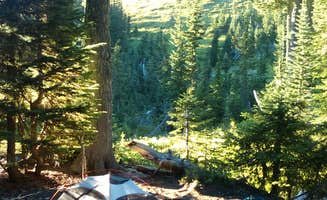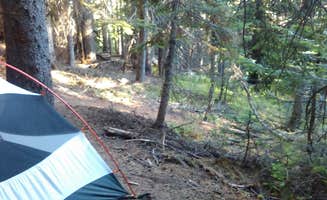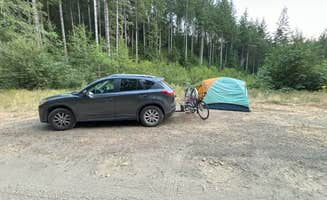Tent campsites near Lakewood, Washington offer diverse experiences from primitive forest settings to mountain backcountry options. The region sits at elevations ranging from sea level along Puget Sound to 5,400 feet at higher Mount Rainier campsites. Winter temperatures average 35-45°F with summer highs reaching 70-80°F, creating a relatively short prime camping season from June through September.
What to do
Explore wildlife encounters: The Healing Farm provides unique animal experiences not found at typical campgrounds. "We gathered eggs, milked goats, fed a porcupine and capybaras, cuddled baby bunnies, met a joey in a pouch, hung out with emus, and even snuggled with goats," reports one camper who visited with their children.
Hike mountain trails: At Mowich Lake Campground in Mount Rainier National Park, campers can access numerous trails directly from the campsite. A visitor noted, "We did the Tolmie Peak trail and the trailhead is straight off the campground which is super nice." The campground sits at a higher elevation, requiring warm clothing even in August.
Paddle to island sites: Kayaking to remote campsites offers a distinctive camping option. One camper explained their journey to Hope Island Marine State Park Campground: "Hope Island is located in the Puget Sound just North of Steamboat Island. To access take Hwy 101 to Taylor Town and drive out to Arcadia Point. There is a gravel parking lot. Kayak the short jont east to the island."
What campers like
Secluded forest sites: Many tent campsites near Lakewood provide privacy within wooded settings. Malaney Creek Farm offers "a few hundred foot hike from where you park your car and the portable toilet. The site was pretty cool and very secluded. It had a fire ring with some sawn cedar benches, a pile of firewood and a giant old spool for a table."
Evening temperatures: Blake Island Marine State Park Campground provides relief from summer heat. A camper observed, "In summer there is generally a burn ban and if you don't have a shaded spot, the heat can be pretty punishing but the temps go way down at night and you'll have a great breeze off of the water."
Wildlife viewing: Campsites throughout the region offer natural wildlife encounters. At White River Dispersed Camping, a visitor shared, "I found a spot right next to the river. There were a few other people, but everyone was very quiet. The second night, I managed to find a spot tucked super far in that had a small private beach."
What you should know
Access challenges: Many desirable campsites require extra effort to reach. White River Dispersed Camping has specific vehicle requirements: "4x4/high clearance vehicles recommended - saw some subarus trying to navigate into a cleared area and it was pretty scrape-y."
Early arrival important: Competition for limited spaces means planning ahead. For Ipsut Creek Backcountry Campground, a camper advised: "The spots seemed small to me, and it was BUSY when we went. It was a walk-in campsite, and luckily we got here early to claim a spot. It definitely was full by the end of the day and the weekend."
Fire restrictions: Seasonal burn bans affect many campgrounds during dry months. At Mowich Lake Campground, fires aren't permitted year-round: "Sadly you cannot build a fire here so it does get really cold at night time because there are glaciers in the park."
Noise considerations: Campground quiet hours vary. Blake Island enforces "strict quiet hours beginning at 10pm" while road noise affects other sites. At White River Dispersed Camping: "You could see the lights and hear the cars driving on the main road, but they eventually stopped."
Tips for camping with families
Animal interactions: Families particularly enjoy The Healing Farm for its unique experiences. One parent shared: "The kids were in Awh with all the animals and how they would let you walk up to them and interact with them. The goats were awesome, they would spend all day out at our camp and they would pose for pictures with us."
Platform camping: Several tent campsites near Lakewood Washington feature raised platforms for easier tent setup. At Mowich Lake, "The campground is beautiful for car campers! It's a loop layout with trash/recycle, bathrooms and designated box type platforms for the tents."
Gear hauling considerations: Many sites require carrying equipment from parking areas. At Macie's Brook, sites offer "a great spot for those looking to setup their tents in an awesome spot" but require planning for gear transport from designated parking areas to the campsites.
Tips from RVers
Access limitations: Most boat-in and backcountry sites aren't suitable for RVs. Even at drive-in locations like Rock Candy Mountain Trailhead, visitors warn: "Not suitable for anything wider than a class B. In my opinion this area is not suitable for winter camping."
Limited hookups: RV sites near Lakewood generally lack full hookups. Sites that accommodate both tents and RVs typically provide minimal amenities. A camper at Rock Candy noted, "It's ok just a spot to pull over and camp really. There is a trail next to it I don't know how far but, it's cool. The road up the Montana is dirt but some parts are very rocky."
Road conditions: Forest service and backcountry roads present challenges for larger vehicles. When accessing White River, "The road can be a bit thin, so I would be careful with extra large vehicles. It is also a bit of a challenging road, so low clearance vehicles wouldn't be treated well."


